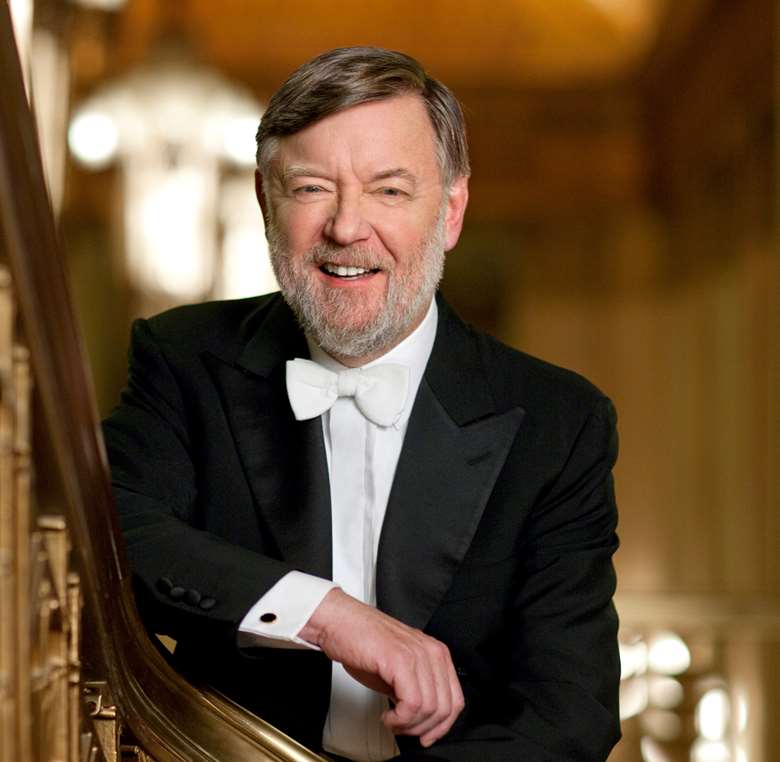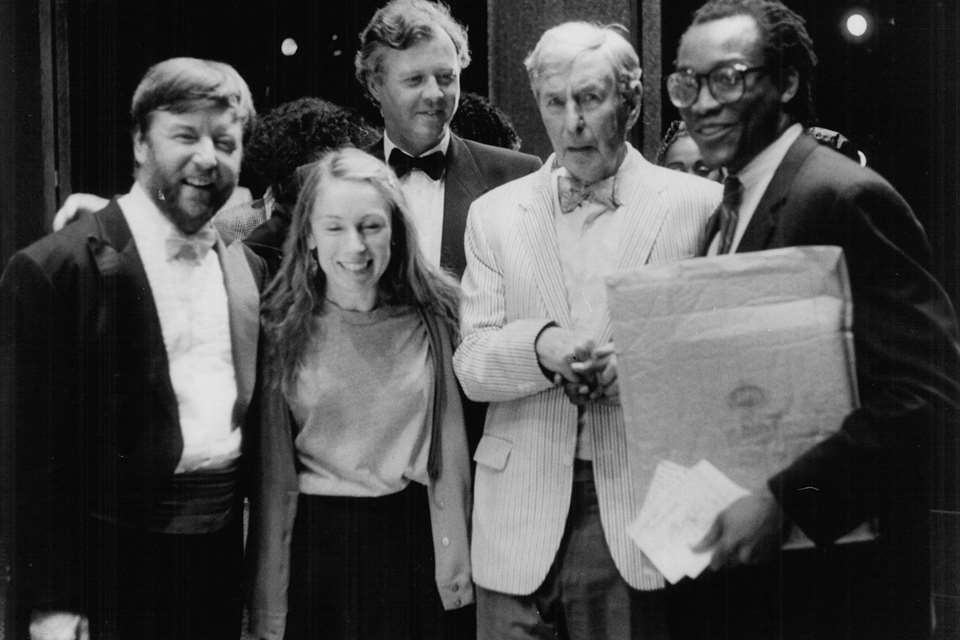Sir Andrew Davis: Obituary
Peter Quantrill
Tuesday, April 23, 2024
A tribute to the great British conductor. Born: February 2, 1944; Died: April 20, 2024

When Felicity Lott was awarded the 2023 Gramophone Lifetime Achievement, more than one witness recalled her performance at the BBC Proms in 1999, singing Elle in Poulenc’s La voix humaine. Her investment in the role was absolute, and she held a full Sunday-night Proms crowd spellbound. As Elle struggles to contain her emotion, so did Lott, and then in sympathy, a good deal of the audience. As the announcer Christopher Cook observed, there was barely a dry eye in the house.
Standing back and letting ‘Flott’ take the applause was Sir Andrew Davis. He had conducted her Countess (in both Le nozze di Figaro and Capriccio) at Glyndebourne, and in much else besides. It was her moment; but it was his night, because after the interval he led an equally definitive account of Stravinsky’s Perséphone. He was approaching the end of his tenure as chief conductor of the BBC Symphony Orchestra (1989-2000), and he was leaving the orchestra in a far better state than he found it.
Davis will be widely remembered as the supreme master of ceremonies at the Last Night of the Proms, and most of all for singing the conductor’s traditional speech in 1992
Known as the workhorse of the BBC Proms across its two-month span, the BBCSO would give a concert every five days, and Davis regularly led five of them. Their Proms together delivered the kind of world-class performances to be expected from the festival’s more glamorous guests from abroad. They opened that season with Tippett’s The Mask of Time – they had given the UK premiere together in 1986. A few weeks later, they gave the premiere of Quickening by Sir James MacMillan. As a complex choral work, it ate up almost all the rehearsal time, but the Bruckner Seventh in the second half flowed and naturally evolved with the self-effacing authority of Davis’s best work.
Having already led the BBCSO in an extensive Stravinsky series in 1997, Davis could be counted a ‘Stravinsky specialist’. But as Edward Seckerson remarked, reviewing the album of Stravinsky symphonies which arose from Davis’s latterday association with Chandos, ‘It’s easy to underestimate the depth and breadth of Andrew Davis’s repertoire and indeed his sterling qualities as a conductor – his ebullience, robust sense of rhythm and razor-sharp ears.’
These are qualities we might also identify with the conducting of Pierre Boulez, a predecessor of Davis at the BBCSO. But how could a conductor known to his Proms audience as ‘Goldilocks’ be taken seriously as an interpreter of Le visage nuptial? Davis’s bluff and pragmatic demeanour, and his evident feeling for the music of Elgar and Vaughan Williams – in short, his Englishness, in the lineage of another BBCSO chief, Sir Adrian Boult – perhaps belied his affinity with Boulez, whom he recognised as ‘the real single follower or disciple of Debussy.’ Davis’s podium language – firstly with baton, latterly without – also owed a good deal to the techniques of both Boult and Boulez.
Earlier in 1999, at the Royal Festival Hall, Davis had given an all-Boulez concert – another remarkable undertaking in itself – no less confident and vibrantly coloured than his accounts of Haydn’s Creation or Vaughan Williams’s Job. Mozart, Berlioz, Elgar, Berg and Tippett might equally be counted as the conductor’s ‘specialisms’. He had made his BBCSO debut in 1970, replacing Eliahu Inbal at short notice to conduct the Glagolitic Mass: no mean feat for a 26-year-old. He duly went on to become known as a ‘Janáček specialist’ too, especially once he had become Music Director of Glyndebourne in 1988.
By the time of that BBCSO debut, Davis was a practised recording musician, but as a harpsichordist and organist. As a pupil and chorister at Watford Grammar School, he had been taken up to Maida Vale Studios in London, and seen from afar the elderly Vaughan Williams with ear-trumpet and braces. As Organ Scholar at King’s College, Cambridge, he accompanied the Choir, led by Sir David Willcocks, on Argo and Decca albums. Having come down from Cambridge, he continued to work in this vein with the likes of David Munrow and Thurston Dart. The experience made him an outstandingly attentive accompanist to singers and instrumental soloists.
Concerts and recordings with the other London orchestras followed that BBCSO debut; so too did his Glyndebourne debut, conducting Capriccio in 1973. Two years later, he took up his first major tenured post, in Toronto (where he was later appointed Conductor Emeritus). Over the next decade, a string of CBS albums demonstrated his versatility, though the best of them were made with the New Philharmonia, in Duruflé, Fauré and Franck.
The BBCSO was in need of a shot in the arm when Davis took over in 1989, and his tenure brought about a golden era for the orchestra. He was an ideal radio-orchestra conductor, in the mould of Hans Rosbaud in Germany, Roger Désormière in France and Thomas Jensen in Denmark, able and willing to conduct anything and everything, efficient in rehearsal yet frequently inspired in concert. Never previously allied to a major commercial label, the BBCSO now undertook a major series on Teldec, ‘The British Line’. In the concert hall, four generations of British composers had cause to be grateful that the first performances of their scores were entrusted to his care; from Tippett (b1905) to Ryan Wigglesworth (b1979).
After the BBCSO, Davis moved to Chicago, to become Music Director of the Lyric Opera, where he could finally fulfil Wagnerian ambitions with stagings of the Ring and Parsifal. Beyond Glyndebourne and their annual visits to the Proms, British audiences heard far too little of Davis the opera conductor, but at the Edinburgh Festival in 2019 he gave a searingly paced (and sung) Götterdämmerung which, once more, hinted at depths of expression and qualities hitherto underappreciated in his native land. His last major post took him to the Melbourne Symphony Orchestra, where once more he galvanised the company, raised artistic standards and left a valuable legacy on record, this time with Chandos, in symphonies and more by Berlioz and Ives (more ‘specialisms’ of his).
Davis will be widely remembered as the supreme master of ceremonies at the Last Night of the Proms, and most of all for singing the conductor’s traditional speech in 1992. From my place at the front of the Arena, however, the performance that stands out in the memory from that season was A Child of our Time by Tippett, which Davis had given the previous night. On that occasion, too, a symbiosis between work and singers and audience left the soloists in tears.
It seems incredible, in retrospect, that the conductor should not have long ago recorded this quintessential example of the English oratorio as updated to its time of world war. It is no less fitting that he should finally have done so for Chandos as the capstone to his career; and with the BBCSO and Chorus, his most enduring musical partners. Davis’s musicianship was collaborative at its heart, not the stuff of individualistic vision or idiosyncratic interpretation. He brought musicians and audiences together, and took them with him.









